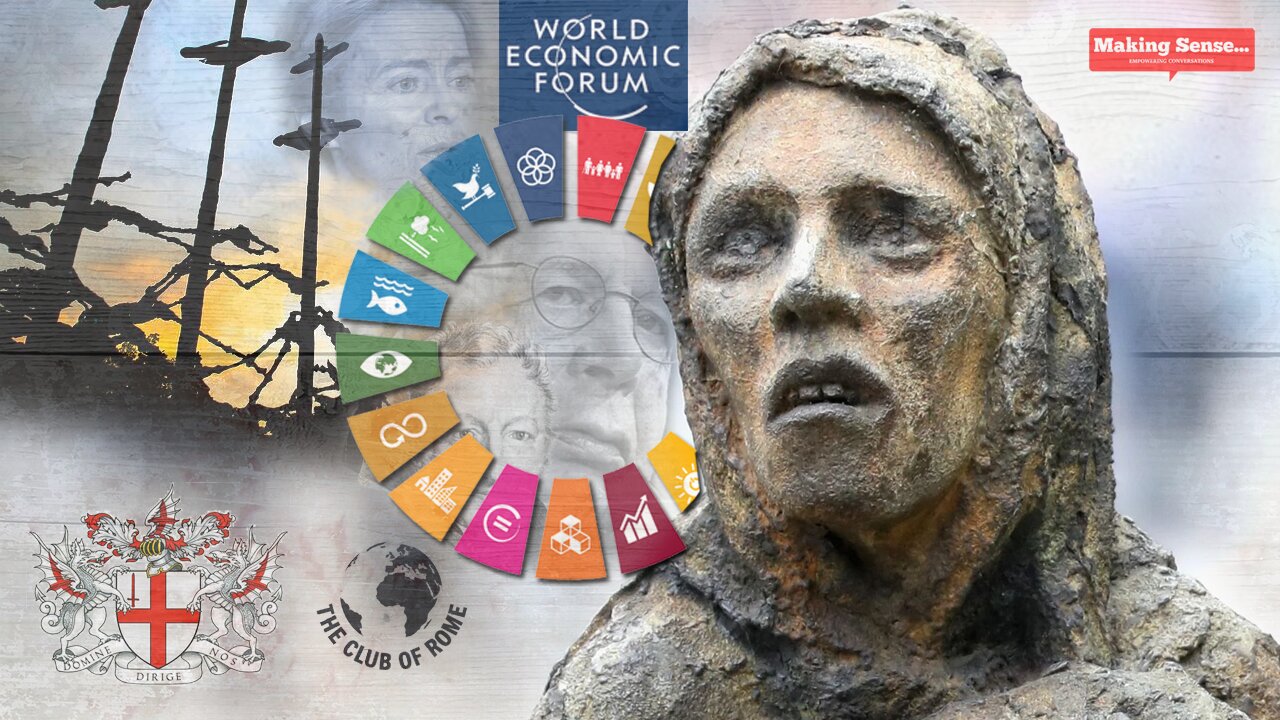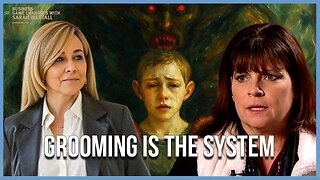Premium Only Content

From The Great Hunger to The Great Reset. Rejecting Malthusianism to Avoid a New Dark Age. Matthew Ehret in conversation with Sara Haboubi.
In the last 3 years the world has been presented with three large crises namely Covid, Climate and the Conflict in Ukraine. In each case, national policy responses continue to be dictated by heavily centralized unelected global institutions such as the WHO, UN and NATO. For each crisis, an inarguable collective virtue is invoked to elicit public buy-in, namely a concern for public health, existential ecological considerations and human empathy for a war-torn people in the face of an 'unprovoked aggressor'.
Despite the institutional hairball at the heart of global affairs, it is becoming clearer and clearer, that the response to these crises (some argue their very genesis), is the handiwork of an organizing entity or a cluster of interests which supersedes the power and leverage even of these global institutions, let alone the sovereignty of individual nation states.
This entity's weakness is in its mechanistic repetition of patterns of control which can be revealed through a careful analysis of history. In fact by studying our past we can clearly see these patterns and how they relate to the distribution and retention of power at different times in our evolution. In turn, by gaining a better understanding of past events, we inform our understanding of the *context* of current events and thus are empowered to better comprehend, predict and even try to shape our future as it unfolds in front of us.
The centrality of history in understanding major events which have a direct impact humanity is an analytical perspective shared by Dr. Mattias Desmet in his expounding of the theory of Massformation: we can learn a lot from history. Our future, as it were, depends upon it.
Kicking off this discussion with journalist, editor and author Matthew Ehret, we look at the Great Hunger which ravaged Ireland in the 1840's and identify the invisible force behind what is now commonly accepted to have been an act of planned genocide.
During this interview, Matthew Ehret persuasively posits that The Great Hunger and The Great Reset are in effect ideological ancestral first cousins, connected through time by an ideology whose principal purpose is the control of the masses and the preservation, sustainability and thus advancement of a relative superclass of transnational oligarchical interests. Its operating system is 'Malthusianism' a kind of analytical framework designed to cast humanity as villain, the source of all the earth's woes.
Malthusianism (or Neo-Malthusianism to give it its upgraded title) is alive and kicking in 2022-2023. We can see it in the vision openly promulgated by the WEF about a future drained of freedom and underpinned by a system of digital control. We can hear it in the comments made by politicians who tell us we are entering a new phase of existence and that the 'Age of Abundance' is over.
To tackle the crises facing the world we are told we must place our trust blindly in the algorithmic power and edicts of opaque computer models and unaccountable centralized bureaucracies.
To this end, in Europe and the wider western world, national leaders have become nothing more than human signposts, abdicating their democratically vested authority and pointing instead to directives handed down by large bureaucracies such as the EU, EMA, WHO, NATO whenever they are asked to explain or to defend government policy. To quote George Orwell, what is to be expected of them is not treachery, or physical cowardice, but "stupidity, unconscious sabotage and an infallible instinct for doing the wrong thing".
In this free-flowing interview with Matthew Ehret of CanadianPatriot.com, we take an analytical look at the ebbs and flows of power throughout history specifically by peering through the colonial prism of the British Crown. Matthew notes the seemingly indelible imprint this institution has left on the world through its advancement of Malthusian ideology, enabled through the installation of various 5th column operations and institutions at the nation state and institutional level and the operation of a regimented system of control which ultimately tracks back to the City of London. Ireland has a unique experience in this respect having suffered for the best part of 800 years under British rule. We learn that the potato famine of the 1840's is more accurately characterised as a planned disaster that befell the country arising from an ideological policy that ran under the banner of British Malthusianism. In 1847, the worst year of the famine, over 4,000 ships left Ireland laded with foodstuffs. Those citizens who had the strength to protest in port towns such as Clonakilty and Skibbereen were kept back by muskets and rows of British soldiers.
The very same ideology behind the Great Famine is that which drives the Great Reset.
By way of an antidote, Matthew discusses the 'no limit' mindset needed to defeat the Malthusianists by lifting humanity to a superior level of evolution. This mindset is best espoused by the plans for a multipolar world, currently being architected by Sergey Glazyev of Russia and the wider BRICS+ nations.
Largely obscured from Western audiences by the smoke and fire of the war in Ukraine, these plans echo the essence of the UN Charter which respects the sovereignty of individual nations and defines progress in terms of a win-win approach to co-operation, investment and trade.
Matthew is a Senior Fellow at American University in Moscow, Founder of Canadian Patriot Review, Rising Tide Foundation and author of Untold History of Canada series.
You can find Matthew on Twitter @ehret_matthew and find out about his most recent publications by heading over to the Canadian Patriot Review https://canadianpatriot.org/
----
We hope you enjoy this conversation - we did! (so much so that the interview continued for 2 hours so we split it in two. Part 2 will be available soon)
Sara and Making Sense Production Team
-

MattMorseTV
4 hours ago $36.41 earned🔴Election Day LIVE COVERAGE.🔴
45.9K29 -
 LIVE
LIVE
Flyover Conservatives
20 hours agoSHOCKING DATA REVEALS: Young Voters Are Done With the Old GOP - Mark Mitchell, Rasmussen Reports | FOC Show
238 watching -
 LIVE
LIVE
Sarah Westall
3 hours agoGrooming is Protected and Encouraged by the System – Michelle Peterson and Mike Adamovich
217 watching -
 LIVE
LIVE
Akademiks
1 hour agoKendrick tries to Flip the Bots on DRAKE? WHo Beats Jay z in a verzuz. Blueface finally free!
1,005 watching -
 1:38:16
1:38:16
Professor Nez
7 hours ago🚨ELECTION NIGHT 2025 LIVE! Massive Upsets Brewing in New York, New Jersey & Virginia!
9.35K5 -
 LIVE
LIVE
Due Dissidence
10 hours agoLIVE: ELECTION RESULTS From NYC, NJ, and VA - Trump Approval CRATERS, Kash's Private Jet CRASH OUT
1,247 watching -
 12:50
12:50
Demons Row
3 hours ago $0.90 earnedBikers of New Jersey 💀🏍️ Pagans, Thunder Guards, and Thug Riders
13.8K4 -
 42:31
42:31
Stephen Gardner
6 hours ago🔥Old Obama Video RESURFACES - His Own Words CONDEMNED Him! Trump Gains MASSIVE Momentum!!
22.5K22 -
 13:09:35
13:09:35
LFA TV
1 day agoLIVE & BREAKING NEWS! | TUESDAY 11/4/25
168K36 -
 1:03:37
1:03:37
BonginoReport
5 hours agoElection Night Showdown Spotlight - Nightly Scroll w/ Hayley Caronia (Ep.170)
113K40